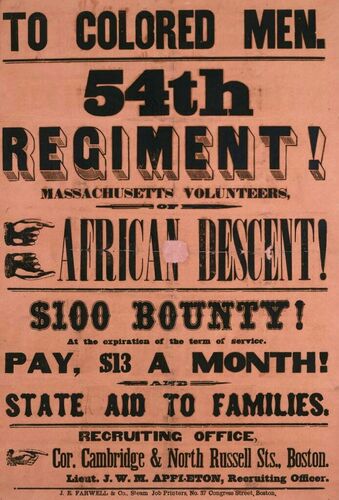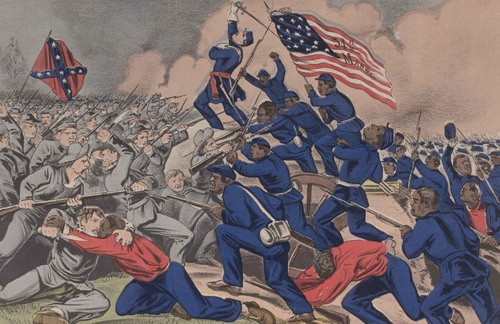54th Massachusetts Regiment
The 54th Massachusetts Regiment was the first African American fighting regiment in the Union Military, and was also the first African American fighting force in our coutnries history. The Civil War was considered a white man's problem and the formation of this regiment was met with great criticism. The Union began recruiting African American soldiers only a few months after the the emancipation procalmation was enacted, so many of the prejudices white people held towards African Americans were still prevelant. Governer John Andrew of Massachusetts, eagerly started recuriting for his states 54th Regiment.
In order to ensure the sucess of the regiment, Governer Andrew knew he needed a strong leader to command the African American troops. Governer Andrew called upon Robert Gould Shaw to take the role. Shaw "grew up in the city’s elite social and political circles before the Civil War. His parents, Francis Shaw and Sarah Sturgis Shaw, committed themselves to societal improvement as reformers and abolitionists." (National Parks Servces). Having grown up in this way, as well as his military background from previous service, Shaw seemed to be the ideal leader for this regiment. Shaw saw it otherwise and declined the offer, however "his mother soon convinced him to change his mind" (National Parks Services). Shaw, now Colonel Robert Gould Shaw, reconginized the importance of the regiments sucess not only to the war effort, but also in closing the divide between African Americans and Whites in the countries eyes.
The ranks of the 54th Massachusetts where quickly filled from volunteers across the Union States, and the regiment began its training in March of 1863. The fighting force was shipped out in May of 1863, and Marched onto their boats in fron of a crowd of twenty thousand people. The regiment was tasked with mostly labor, until they where given a chance to prove themselves in a skirmish on July 16th, 1863. This skirmish, known as the Battle of Grimball's Landing, took place on James Island and served as a diversion before the notorious Battle of Fort Wagner.
After The Battle of Fort Wagner, the 54th Massachusetts Regiment continued to serve valiantly in Charleston. The regminet saw brief combat activity in Florida in 1864, but for the most part defended and supported troops in forts under Union control. While the Battle of Fort Wagner was a defeat for the Union forces, the actions of the 54th gained widespread respect and admiration for the African American soldiers, and by 1865 the Union army had enlisted around 180,000 African American soldiers, roughly ten percent of all Union troops. The men of the 54th also fought for the equal pay of Black Civil War Soldiers.
In a letter from Sergeant Francis Fletcher of the 54th Massachusetts to Jacob C. Safford, Sergeant Fletcher outlines much of the hardships his regiment faces, and how the late passing of a bill giving equal pay to all troops was not enough to "atone" for the hardships and discrimination the African American soldiers faced.
Below is a quick podcast further detailing the 54th Massachusetts Regiment and its hardships, narrorated by Noire Histoir.
The 54th Massachusetts Regiment may have failed in their goal of capturing Fort Wagner, but their actions paved the way for other African American soldiers in the future, and also quelled all skepticism on enlisting African Americans from white americans. They not only fought bravely, they also petitioned for equal treatment and pay within the American Military. Their story, which is often skimmed over in history books, was a vitaly important aspect of the Civil War and deserves more widespread attention from the American public. The motion picture Glory released in 1989 highlighted the 54th's story, and was a good step in towards a mainstream understanding of their sacrifices. The 54th is not the first and will surely not be the last example of marginilized groups garnering less attention, and this is a societal problem that must be fixed to obtain a deeper wholistic understanding if history. Realizing this trend of ignoring diverse stories is something we need to understand as a global community, and action needs to be taken to find these stories and bring them to light by all people.



